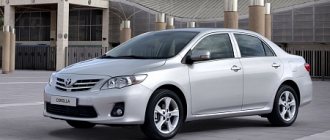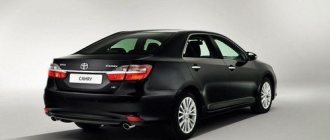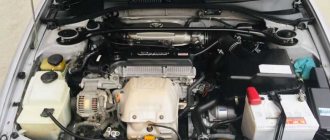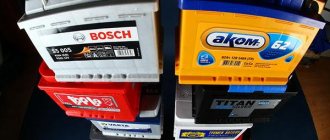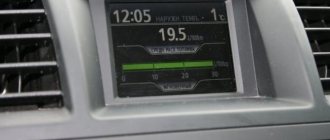Rated fuel consumption is one of the most informative and important characteristics of a car for the driver. This is what manufacturers often use to advertise and promote a particular new car model.
Among owners of used cars, it is considered acceptable to consume up to 10 liters of gasoline or diesel per 100 kilometers. In foreign countries, this indicator is indicated in miles, so recalculation into “native” units is often necessary. The fuel consumption tables available in this section of the site are considered very useful.
What does the fuel consumption indicator indicate? What does this characteristic mean? We are talking about hydrocarbon fuel consumption. For example, for an SUV the figure corresponds to 9.5 liters per 100 km. It is quite acceptable, primarily due to the weight and power of the car. The indicator can be reduced due to the following:
- use of energy recovery systems during braking;
- lightening the weight of the car when replacing body and chassis elements with innovative materials;
- engine improvements;
- replacing the exhaust system.
For new models, consumption of 6 l/100 km is considered quite a “cruising” figure, but it will be higher for heavy SUVs and pickups and lower for small hybrids. The necessary information can be found in the tables provided.
What to do if fuel consumption is higher than rated? If the car consumes more fuel and does not correspond to the nominal value indicated in the table, this means there is a malfunction. Experienced service center technicians will tell you how serious it is and how it can be eliminated. In some cases, tuning makes it possible to further optimize fuel consumption, but this is usually achieved by lightening the body structure or by replacing the engine. Professional automotive technicians can provide specific recommendations.
Fuel consumption of Toyota Kaldina ranges from 5.6 to 10.6 liters per 100 km.
Toyota Caldina is available with the following types of fuel: Regular gasoline (AI-92, AI-95), Premium gasoline (AI-98), Diesel fuel.
Fuel consumption Toyota Caldina restyling 2005, station wagon, 3rd generation, T240
| Engine capacity | Power | Transmission | Drive unit | Fuel | Consumption |
| 1.8 l | 132 hp | Automatic transmission | front-wheel drive | Gasoline Regular (AI-92, AI-95) | 6,4 |
| 2.0 l | 155 hp | Automatic transmission | front-wheel drive | Gasoline Regular (AI-92, AI-95) | 7,6 |
| 2.0 l | 155 hp | Automatic transmission | four-wheel drive (4WD) | Gasoline Regular (AI-92, AI-95) | 8,1 |
| 2.0 l | 260 hp | Automatic transmission | four-wheel drive (4WD) | Premium gasoline (AI-98) | 9,4 |
What kind of battery was installed on the Toyota Kaldina?
Toyota caldina battery
produced by Furukawa Battery. This company produces almost all power supplies for modern Japanese cars.
How the battery was selected:
- T oyota caldina battery
was selected according to several parameters. The main one was the starting current. The manufacturer decided to use a battery with 530A starting current on its station wagon. - The Kaldina battery
has a relatively average capacity. It is 65Ah. However, this is enough even for long trips. - The Toyota Kaldina battery
is made in a Japanese 75D23R case. Its dimensions are 232x173x225mm.
Fb super nova battery for Toyota Kaldina:
| Brand | Model | Capacity indicator A/h | Starting current | Warranty period | Cost without exchange |
| FURUKAWA BATTERY | |||||
| Japan |
As can be seen from the table, the battery has good performance for its price. However, the latest models were released a relatively long time ago. Therefore, it is necessary to replace them with something newer.
Fuel consumption Toyota Caldina 2002, station wagon, 3rd generation, T240
| Engine capacity | Power | Transmission | Drive unit | Fuel | Consumption |
| 1.8 l | 132 hp | Automatic transmission | front-wheel drive | Gasoline Regular (AI-92, AI-95) | 6,4 |
| 2.0 l | 152 hp | Automatic transmission | front-wheel drive | Gasoline Regular (AI-92, AI-95) | 7,1 |
| 2.0 l | 150 hp | Automatic transmission | four-wheel drive (4WD) | Gasoline Regular (AI-92, AI-95) | 7,7 |
| 2.0 l | 260 hp | Automatic transmission | four-wheel drive (4WD) | Premium gasoline (AI-98) | 9,4 |
Premium Battery Options
| Brand | Model | Capacity indicator A/h | Starting current | Warranty period | Cost without exchange |
| FURUKAWA BATTERY | |||||
| Japan |
| South Korea |
| Czech |
Fuel consumption Toyota Caldina restyling 2000, station wagon, 2nd generation, T210
| Engine capacity | Power | Transmission | Drive unit | Fuel | Consumption |
| 1.8 l | 115 hp | Manual transmission | front-wheel drive | Gasoline Regular (AI-92, AI-95) | 5,7 |
| 1.8 l | 115 hp | Automatic transmission | front-wheel drive | Gasoline Regular (AI-92, AI-95) | 6,5 |
| 2.0 l | 135 hp | Manual transmission | four-wheel drive (4WD) | Gasoline Regular (AI-92, AI-95) | 7,9 |
| 2.2 l | 94 hp | Automatic transmission | four-wheel drive (4WD) | Diesel fuel | 8,1 |
| 2.0 l | 140 hp | Automatic transmission | front-wheel drive | Gasoline Regular (AI-92, AI-95) | 8,3 |
| 2.0 l | 135 hp | Automatic transmission | four-wheel drive (4WD) | Gasoline Regular (AI-92, AI-95) | 8,8 |
| 2.0 l | 190 hp | Automatic transmission | front-wheel drive | Premium gasoline (AI-98) | 8,9 |
| 2.0 l | 260 hp | Manual transmission | four-wheel drive (4WD) | Premium gasoline (AI-98) | 9,1 |
| 2.0 l | 190 hp | Automatic transmission | four-wheel drive (4WD) | Premium gasoline (AI-98) | 9,3 |
| 2.0 l | 260 hp | Automatic transmission | four-wheel drive (4WD) | Premium gasoline (AI-98) | 9,8 |
Description of the 2ST motor device
The 2ST engine has 4 cylinders with two valves each. The cylinder diameter is 86 millimeters. These parts are installed in the cylinder block, which is cast entirely from cast iron. Only the cylinder head of the 2ST engine differs from the BC in that it is made of duralumin alloy.
The cylinder head is most susceptible to overheating. It warps and warps from any high temperature. Therefore, if the engine overheats for a long time, the cylinder head will quickly fail and the engine will require major repairs.
This is where the inconsistency of the autodiesel begins. The cooling system on the power unit initially works poorly. If the motor is constantly exposed to overheating, then not only the cooling system, but also the entire motor quickly fails. This is especially visible in the southern regions of the country and among car owners with a negligent attitude towards the engine.
Despite the problems with cooling, the engine fully justifies the tasks assigned to it for transporting people, long-distance travel or traveling from country to another country. For example, residents of the northern regions note that the engine will easily cover 250,000 kilometers without major repairs.
The timing system of the engine is a SOHC modification. The 2ST power unit has one camshaft. The timing mechanism is driven by a belt.
Attention! Experienced mechanics warn that the belt needs “an eye and an eye.” Because a break in this timing element leads to bending of the valves. And such a breakdown means a major overhaul of the engine.
Despite the ease of repair and some reliability, the 2ST engine is gradually leaving the market. Demand is decreasing because brighter stars have appeared in the sky of diesel engines that meet modern environmental standards.
Fuel consumption Toyota Caldina 1997, station wagon, 2nd generation, T210
| Engine capacity | Power | Transmission | Drive unit | Fuel | Consumption |
| 1.8 l | 115 hp | Manual transmission | front-wheel drive | Gasoline Regular (AI-92, AI-95) | 5,7 |
| 1.8 l | 115 hp | Automatic transmission | front-wheel drive | Gasoline Regular (AI-92, AI-95) | 6,5 |
| 2.0 l | 135 hp | Manual transmission | four-wheel drive (4WD) | Gasoline Regular (AI-92, AI-95) | 7,9 |
| 2.0 l | 140 hp | Automatic transmission | front-wheel drive | Gasoline Regular (AI-92, AI-95) | 8,3 |
| 2.0 l | 135 hp | Automatic transmission | four-wheel drive (4WD) | Gasoline Regular (AI-92, AI-95) | 8,8 |
| 2.0 l | 260 hp | Manual transmission | four-wheel drive (4WD) | Premium gasoline (AI-98) | 9,1 |
| 2.0 l | 190 hp | Automatic transmission | four-wheel drive (4WD) | Premium gasoline (AI-98) | 9,3 |
| 2.0 l | 260 hp | Automatic transmission | four-wheel drive (4WD) | Premium gasoline (AI-98) | 9,8 |
Which cars were equipped with the 2ST power unit?
The Toyota 2ST diesel engine was installed on the following vehicles:
Similar article Design and principle of operation of an internal combustion engine
- Avensis T220. Installed from 1997 to 2000;
- Corolla from 1996 to 1997;
- LiteAce M30 from 1985 to 1992;
- Caldina;
- Corona;
- Camry from 1986 to 1991.
Experienced mechanics advise carrying out annual preventative maintenance on the engines of the vehicles described above. Then the car owner will not know grief with the 2ST engine.
Fuel consumption Toyota Caldina restyling 1996, station wagon, 1st generation, T190
| Engine capacity | Power | Transmission | Drive unit | Fuel | Consumption |
| 1.8 l | 115 hp | Manual transmission | front-wheel drive | Gasoline Regular (AI-92, AI-95) | 5,6 |
| 1.8 l | 115 hp | Automatic transmission | front-wheel drive | Gasoline Regular (AI-92, AI-95) | 6,4 |
| 2.0 l | 140 hp | Automatic transmission | front-wheel drive | Gasoline Regular (AI-92, AI-95) | 7,7 |
| 2.0 l | 135 hp | Manual transmission | four-wheel drive (4WD) | Gasoline Regular (AI-92, AI-95) | 8,1 |
| 2.0 l | 135 hp | Automatic transmission | four-wheel drive (4WD) | Gasoline Regular (AI-92, AI-95) | 9,1 |
| 2.0 l | 175 hp | Manual transmission | four-wheel drive (4WD) | Premium gasoline (AI-98) | 9,4 |
| 2.0 l | 165 hp | Automatic transmission | four-wheel drive (4WD) | Premium gasoline (AI-98) | 10,6 |
What kind of oil to fill in a Toyota Kaldina diesel engine
In first-generation diesel engines with a small residual engine life, you can pour CF-4 quality engine oil according to the API according to the manual. For newer diesel engines in second-generation cars, a technical fluid with API CI-4 approval would be a good choice. For all-season use, branded Japanese oil with a viscosity of 5W-40 is suitable. In the summer, it is permissible to switch to oil 10W-30/10W-40 according to SAE and quality CI-4 according to API.
| TOYOTA DIESEL CF-4 SAE 10W-30 5 liters Article: 08883-01905 Average price: 2700 rubles 1 liter Article: 08883-01906 Average price: 650 rubles | Castrol Magnatec Diesel 10W-40 4 liters Article: 15CA30 Average price: 1550 rubles 1 liter Article: 15CA2F Average price: 430 rubles |
| Lukoil Avangard Ultra 10W-40 API CI-4 5 liters Article: 19518 Average price: 1400 rubles 1 liter Article: — Average price: — | ROSNEFT MAXIMUM SL/CF 10W-40 4 liters Article: 4296 Average price: 900 rubles 1 liter Article: 4295 Average price: 300 rubles |
Fuel consumption Toyota Caldina 1992, station wagon, 1st generation, T190
| Engine capacity | Power | Transmission | Drive unit | Fuel | Consumption |
| 2.2 l | 79 hp | Manual transmission | front-wheel drive | Diesel fuel | 5,6 |
| 1.5 l | 97 hp | Manual transmission | front-wheel drive | Gasoline Regular (AI-92, AI-95) | 6,4 |
| 2.2 l | 79 hp | Automatic transmission | front-wheel drive | Diesel fuel | 6,8 |
| 2.2 l | 79 hp | Manual transmission | four-wheel drive (4WD) | Diesel fuel | 6,8 |
| 1.5 l | 97 hp | Automatic transmission | front-wheel drive | Gasoline Regular (AI-92, AI-95) | 7,4 |
| 2.0 l | 135 hp | Automatic transmission | four-wheel drive (4WD) | Gasoline Regular (AI-92, AI-95) | 8,3 |
| 2.0 l | 135 hp | Automatic transmission | four-wheel drive (4WD) | Gasoline Regular (AI-92, AI-95) | 8,8 |
Engine oil for Toyota Caldina petrol
Original oil
Since all Toyota Kaldina gasoline engines have high mileage, it is best to use semi-synthetic motor oils. The manufacturer recommends using branded Toyota Motor Oil. Synthetic original oil is also suitable for car engines. Preferred viscosity is 5W-30. Malo must meet SJ API requirements for first and second generation cars, and at least SL API requirements for third generation gasoline power units. Today, new API standards SM and SN are known, covering all previous tolerances. We recommend using this particular lubricant. For older engines, technical fluid A5/B5 according to ACEA classification is well suited.
| Toyota Motor Oil SN GF-5 5W-30 4 liters Article: 08880-10705 Average price: 2200 rubles 1 liter Article: 08880-10706 Average price: 650 rubles | Toyota Motor Oil SM 5W-30 4 liters Article: 08880-09105 Average price: 2400 rubles 1 liter Article: 08880-09106 Average price: 680 rubles |
Approved analogues by tolerance
| Liqui Moly Leichtlauf High Tech LL 5W-30 5 liters Article: 39007 Average price: 3150 rubles 1 liter Article: 39005 Average price: 800 rubles | Liqui Moly Special Tec LL 5W-30 5 liters Article: 8055 Average price: 3190 rubles 1 liter Article: 8054 Average price: 850 rubles |
| ZIC X9 5W-30 4 liters Article: 162614 Average price: 1850 rubles 1 liter Article: 132614 Average price: 550 rubles | Shell HX-8 Synthetic 5W-30 4 liters Article: 550040542 Average price: 1950 rubles 1 liter Article: 550040462 Average price: 525 rubles |
Fuel consumption Toyota Caldina 1992, station wagon, 1st generation, T190
| Engine capacity | Power | Transmission | Drive unit | Fuel | Consumption |
| 1.8 l | 125 hp | Manual transmission | front-wheel drive | Gasoline Regular (AI-92, AI-95) | 6,8 |
| 1.8 l | 125 hp | Automatic transmission | front-wheel drive | Gasoline Regular (AI-92, AI-95) | 8,2 |
| 2.0 l | 135 hp | Manual transmission | four-wheel drive (4WD) | Gasoline Regular (AI-92, AI-95) | 8,3 |
| 2.0 l | 140 hp | Automatic transmission | front-wheel drive | Gasoline Regular (AI-92, AI-95) | 8,5 |
| 2.0 l | 175 hp | Manual transmission | four-wheel drive (4WD) | Premium gasoline (AI-98) | 9,4 |
| 2.0 l | 135 hp | Automatic transmission | four-wheel drive (4WD) | Gasoline Regular (AI-92, AI-95) | 9,8 |
| 2.0 l | 165 hp | Automatic transmission | four-wheel drive (4WD) | Premium gasoline (AI-98) | 10,6 |
Advantages and disadvantages of 2C units
The biggest criticism is the aluminum cylinder head. Cracks on it are a fairly common occurrence. At the same time, it is quite difficult to restore it; most car services offer contract heads.
2C engines do not have high power, so they constantly work under heavy load, especially on heavy minibuses. For this reason, the block head experiences large temperature overloads. Overheating in itself does not cause cracks. The problem is a local temperature difference, which entails large internal stresses. Eventually the head cracks.
What do cracks in the head cause?
The situation is aggravated by a design miscalculation that was present on the 1C motors and was inherited by the new motor. The expansion tank is located in the engine compartment below the level of the head. When the engine heats up, the coolant is forced into the expansion tank. When cooling, the opposite should happen, the fluid should return to the cylinder head.
In fact, air is sucked into the head along with the coolant through a leaky radiator filler cap. Air gradually accumulates in the system, which ultimately leads to deformation of the head.
The turbine is also cooled with antifreeze; when air enters, the cooling worsens. The oil in the turbine overheats, which causes oil starvation and premature failure of the turbine. In some cases, the turbine not only stops pumping air, but fills the intake manifold with oil and the engine starts to stall.
You can get rid of air in the cooling system in a simple way by raising the expansion tank above the level of the head. But the engine will still remain thermally loaded.
An unpleasant feature of these engines is the loss of compression in cylinders 3 and 4. This is due to a leaky air line from the filter to the intake manifold. Dust mixed with oil from the crankcase ventilation tube acts as an abrasive, under the influence of which valve plates and piston rings wear out.
Sometimes compression is lost due to excess soot in the EGR system.
Among the advantages of the motor, only reliable operation of the fuel injection pump with a mechanical drive is noted. On versions with electronically controlled injection pumps, fuel consumption is reduced, exhaust emissions are reduced, and the engine runs less loudly. But such a system is difficult to regulate. Most service stations do not have equipment for full adjustment, and there are few specialists. Despite these difficulties, engines with electronic fuel injection pumps are more durable.
The situation is aggravated by the lack of components; Denso has stopped supplying the main components of such fuel pumps.
In general, reviews of Toyota 2C engines are negative. The units are considered unreliable, short-lived, and are considered among the worst engines of the corporation. Although in light cars, for example, Toyota Carina, engines with proper care and gentle operation can last up to 300 thousand km.
